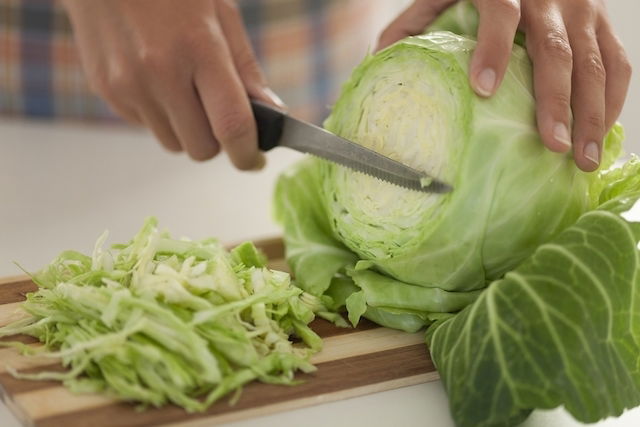Foods that cause gas, like beans and broccoli for example are rich in fiber and carbohydrates, which are fermented by intestinal flora during digestion. These types of nutrients take longer to digest, leading to longer fermentation times and a higher flatulence and bloating, which can vary from person to person.
For this reason, you should be assessed by a registered dietitian to identify which foods tend to produce more gas in you, so that a customized nutritional plan can be created that suits your needs. Intestinal intolerance to these foods depends on the person, so not all people will develop flatulence if they eat the same meal. Learn more about other causes of gas and what you can do to treat this symptom.
Avoiding a specific food altogether is not always necessary, as simply reducing quantities and frequencies can be enough to achieve tolerance and reduce gas formation. Foods that are rich in fats and proteins, such as meats and nuts, will ferment for less time in the intestines and produce less gas overall.

Gassy foods
The main foods that can cause gas and bloating include:
1. Beans
Beans and other legumes in general are known to cause intestinal gas. They are rich in fiber and starch like rafinose, that are harder to digest, leading to longer fermentation time in the colon and increased gas production.
There are many ways you can reduce gas produced by beans, like allowing them to soak for 12 hours before cooking and ensuring they are thoroughly cooked before serving.
2. Sweet potato
Sweet potatoes can cause gas because they are a rich in starch. Starch is a type of carbohydrate that is digested very slowly, which can lead to the production of more gas in the large intestine. Learn more about the symptoms of gas and how they can present.
3. Cauliflower
Cauliflower can cause gas, because this vegetable is rich in raffinose. This is a type of carbohydrate that is not immediately absorbed by the body. It is fermented in the gut by intestinal bacteria, leading to symptoms such as abdominal swelling and discomfort.
Cauliflower also contains glucosinolates, a phytonutrient that contains sulfur. This compound can lead to foul-smelling gas.
4. Milk
Milk can cause gas in people with a lactose intolerance or sensitivity. This condition is characterized by a lack or reduce amount of lactase enzymes, and therefore undigested lactose sugars are digested by gut bacteria. This leads to the release of hydrogen and short-chain fatty acids, which produce gas.
In these cases, milk and dairy products can be replaced with lactose-free versions or plant-based milk, such as almond and soy milk.
5. Oats
Oats and other whole grains, such as brown rice and corn, can cause gas because they are rich in fiber, raffinose and starch. These favor the formation of gas in the intestine during digestion.
6. Chickpeas
Chickpeas can cause intestinal gas, as this legume contains good amounts of resistant starches such as raffinose and stachyose that are not digested by the body and are fermented by intestinal bacteria that produce excess gas.
7. Egg
The sulfur in eggs can cause gas, as this compound favors the formation of intestinal gas in some people. Sulfur also gives gas a foul odor.
8. Cabbage
Cabbage is rich in raffinose, a type of carbohydrate that can cause gas when metabolized in the intestine. Like eggs, cabbage is also high in sulfur, a compound that leads to foul-smelling gas.
9. Banana
Bananas can cause gas in some people, as this fruit is rich in soluble fiber. This type of fiber is not easily digested in the intestine, which can lead to the formation of gas.
Bananas also contain fructose, a natural sugar present in fruits that can cause abdominal bloating and excess gas. These symptoms are especially prone to happen in fructose is consumed in excess or consumed by people with irritable bowel syndrome.
Also recommended: Banana Diet: Weight Loss, Rules & Meal Plan tuasaude.com/en/banana-diet10. Broccoli
Broccoli can cause gas because it is rich in raffinose, a type of carbohydrate that is fermented by intestinal bacteria.
11. Onion
Onions contain fructose, raffinose and sorbitol, compounds that are digested and fermented by gut bacteria and naturally produce gas.
12. Soda
Soft drinks, sparkling water, beer and other carbonated drinks, facilitate air entry into the intestines, causing stomach and intestinal gas. Opt instead for water and teas that naturally reduce bloating.
How to get rid of gas
Some tips for eliminating gas naturally include:
-
Avoid the consumption of candy and gum, as they encourage the ingestion of air which can lead to abdominal discomfort and gas and
- Reduce your intake of foods that cause gas
- Avoid the consumption of milk and dairy products if you have been diagnosed with a lactose intolerance;
- Chew food well.
Additionally, drinking some teas, such as fennel, cardamom and ginger, can also help eliminate excess gas. Check out other home remedies for gas and how to prepare them.
Also be sure to check-out how to relieve gas during pregnancy using safe, natural methods.
